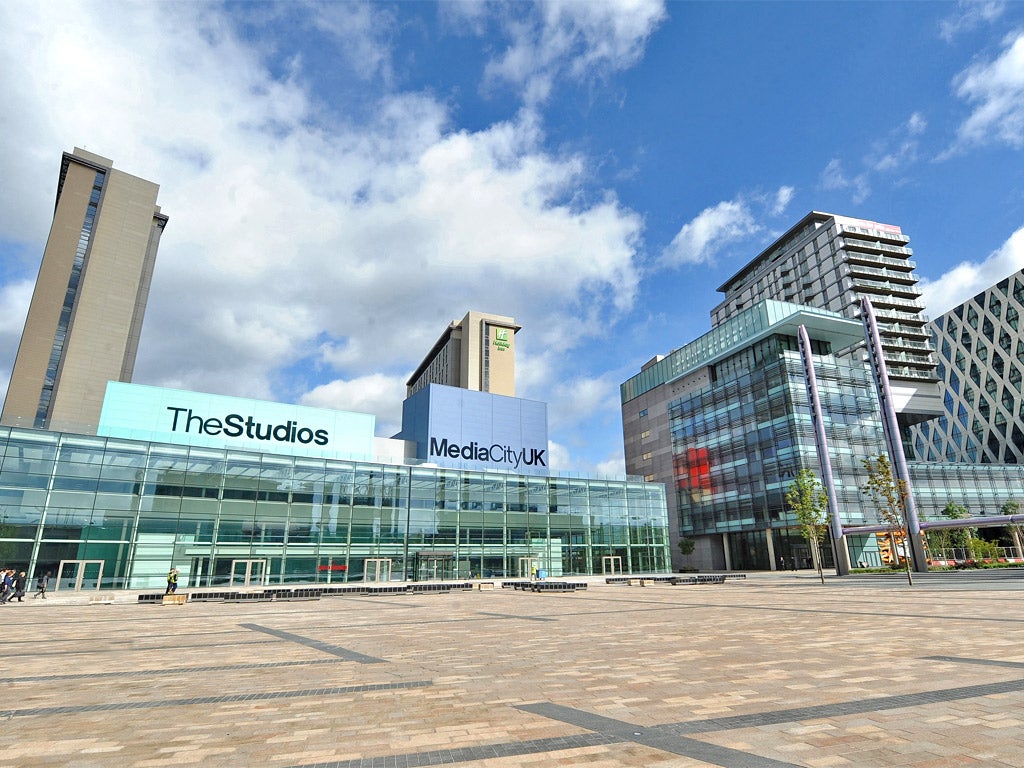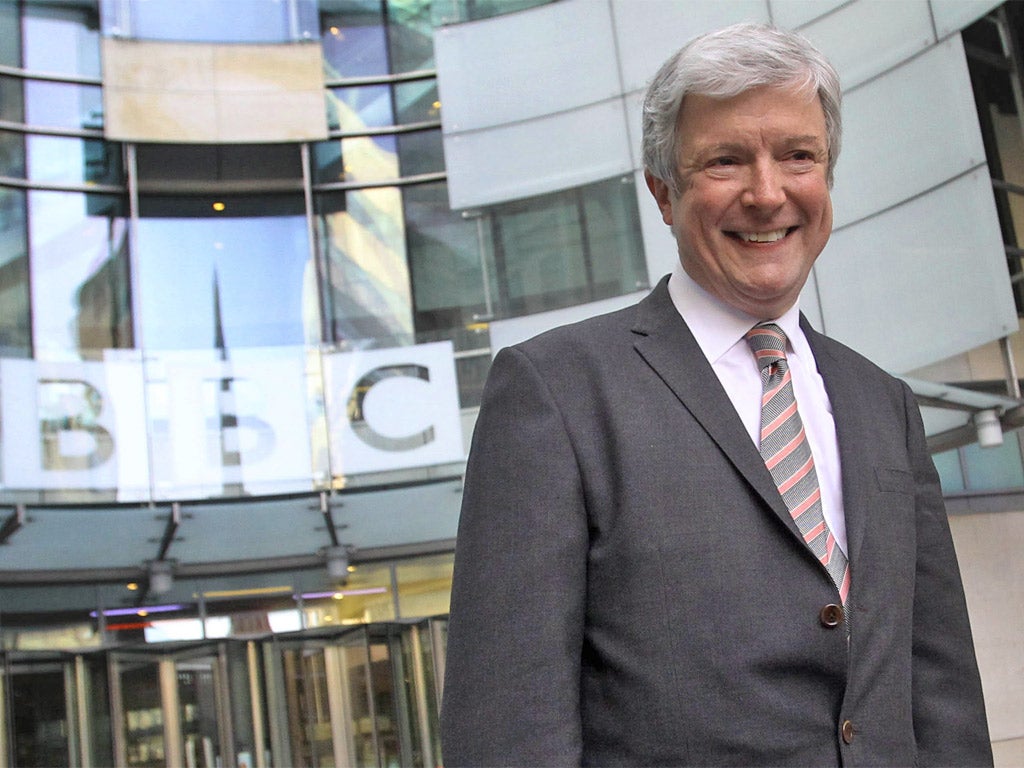BBC censured by watchdog over links with property giant and £150,000 relocation payouts
Company that owns new Salford centre has been criticised over its tax affairs

Your support helps us to tell the story
From reproductive rights to climate change to Big Tech, The Independent is on the ground when the story is developing. Whether it's investigating the financials of Elon Musk's pro-Trump PAC or producing our latest documentary, 'The A Word', which shines a light on the American women fighting for reproductive rights, we know how important it is to parse out the facts from the messaging.
At such a critical moment in US history, we need reporters on the ground. Your donation allows us to keep sending journalists to speak to both sides of the story.
The Independent is trusted by Americans across the entire political spectrum. And unlike many other quality news outlets, we choose not to lock Americans out of our reporting and analysis with paywalls. We believe quality journalism should be available to everyone, paid for by those who can afford it.
Your support makes all the difference.The BBC has been censured by Parliament’s spending watchdog over its relationship with a powerful property company which has been criticised over its tax arrangements.
The BBC has been censured by Parliament's spending watchdog over a controversial relationship with a powerful property company which has been criticised over its tax arrangements.
In a report published today, the Public Accounts Committee raised concerns over the BBC's arrangements with the Peel Group, a private real estate conglomerate which owns the BBC's new Salford broadcasting complex. The PAC also complained that the BBC had paid staff up to £150,000 in inducements to move north. Some were given monthly allowances of £1,900 to allow them to rent flats in the Manchester area and return to London every weekend for up to two years.
Although the PAC described the relocation payments in a move to Salford which cost as £224m as “excessive”, the MPs expressed particular concern over the BBC's dependent relationship with the Peel Group property giant, which has a powerful presence in the north-west of England. “The BBC risks becoming overly dependent on the Peel Group for long-term success at Salford,” said the report. “The Peel Group owns the BBC's buildings at Salford, the on-site studio facilities and surrounding property.”
During earlier evidence to the PAC, the Labour MP Fiona Mactaggart made reference to a report on the Peel Group by the think tank ExUrbe “which suggests that the most profitable parts of the Peel Group are managing to pay nil UK corporation tax.” In June, the MPs made a visit to the BBC premises at Salford's Media City and the committee chair Margaret Hodge - who has previously criticised companies such as Google, Amazon and Starbucks over their UK tax arrangements - said the Peel Group was not contributing enough to the Inland Revenue, claiming the group paid a maximum average of 10 per cent corporation tax. “They do not pay their fair share,” she said.
The Peel Group claims that Peel Media, the part of the company that developed and owns Media City, is UK domiciled and pays “the appropriate level of UK tax”. It “rejects any assertion that it is not paying its fair share of corporation tax.”
In its report, the PAC warns of a danger to the BBC's reputation if it forms questionable business partnerships. “The BBC's relationship with significant partner organisations also involves potential reputational risks for the BBC, for example, the extent to which partner organisations are transparent about their tax status in the UK and the amount of tax they pay,” it said. “We expect the BBC to set clearly-defined expectations for its relationship with commercial partners and to undertake sufficient due diligence to ensure these expectations are met and do not threaten the reputation of the BBC itself.”

The committee demanded that the BBC executive to provide evidence to the governing BBC Trust showing that it assessed the “potential risks” of allowing the Peel Group to have a “dominant position” at Salford. “It should also make clear its expectation that, as an organization funded by the licence fee, it expects companies with which it contracts to pay their fair share of tax.”
Peel Group is behind some of the biggest regeneration project in the north-west of England, including the £5.5 billion Liverpool Waters skyscraper project, which it claims will create 20,000 jobs but has been criticised by English Heritage.
The BBC entered a 20 year lease with the Peel Group on three office buildings at Salford, with an estimated lifetime rental cost of £171m. The broadcaster also entered a separate 10 year contract with Peel for studios at the site and committed to a minimum spend under that contract of £82.8m, according to a report by the Comptroller & Auditor General this year.
In its report the PAC also expressed concerns over the BBC's disastrous handling of the Digital Media Initiative (DMI), which was scrapped at a cost of almost £100 million. The DMI, which was intended to create a production system linked to the BBC's archive, cost £98.4 million since it started in 2008. Ms Hodge said she was “dismayed” at the abandonment of the scheme and the committee would further investigate the issue.
She acknowledged that the BBC had done “a good job in completing the move to Salford on time, within budget and without disruption to the television and radio services we all enjoy”. But she was also critical of the relocation payments. “The scale of some of the allowances paid to staff to relocate to Salford is difficult to justify,” she said. “There were 11 cases where the cost of relocating staff exceeded £100,000 per person, with one costing £150,000.”
The BBC said: “We are pleased that the Public Accounts Committee has recognised BBC North was delivered on time, under budget and with no break in services. We have just celebrated two years of award-winning TV, radio and online content and the whole region is sharing in the momentum of Media City.”
Presenters on the move
Bill Turnbull
The main male presenter on the BBC's Breakfast television show, Surrey-born Turnbull has moved north to live in the Peak District and is one of the most high profile figures at Salford Media City.
Louise Minchin
Another regular on the BBC Breakfast couch, Minchin - a keen surfer - has made a permanent move north, unlike colleague Susanna Reid, who has retained her home in the south.
Nicky Campbell
The Scot was a cheerleader for the move to Salford, quipping that for him “this is down south” and that as a Radio 5 Live breakfast presenter he was looking forward to “longer in bed”, away from the London traffic.
Shelagh Fogerty
Popular Radio 5 Live host bought a flat in Manchester - though the Liverpudlian spent much of yesterday berating the council on Twitter.
Helen Skelton
Carlisle-born and Manchester-based presenter who recently left Blue Peter after hosting the show for five years. Also works on BBC shows Countryfile and Holiday Hit Squad.
Join our commenting forum
Join thought-provoking conversations, follow other Independent readers and see their replies
Comments